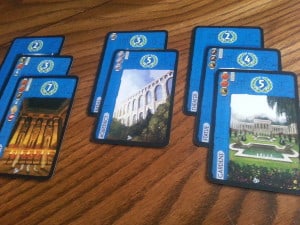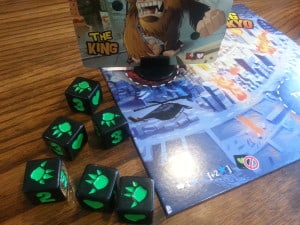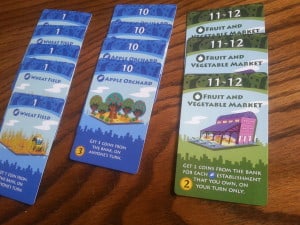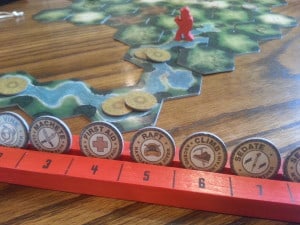
In an earlier article about types of gamers, I introduced you to four personalities that, individually or in combination, do a pretty good job of personifying how gamers will play your game and try to win it. In a brief review, Sue will make a straight line for the victory condition. BUTCH (he’s intense, so he’s capitalized) wants to win by a huge margin. Aimeyj (pronounced Amy) wants to win unconventionally. Finally, Raphael might win, but it is unlikely as he will be busy exploring every nook and cranny in the world of your game.
THE BEST GAMES WILL HAVE SOMETHING TO OFFER EACH OF THE FOUR TYPES OF GAMERS
We, as game makers, have the responsibility to consider every type of gamer. Now we can dig a little deeper, and consider how to go about designing for the four types of gamers.
SUE

Don’t be surprised if Sue tries this approach in Seven Wonders. Don’t worry – if it doesn’t work for her, she’ll figure out what does.
Give Sue the confidence that her decisions matter. Sue isn’t too comfortable with games that rely too heavily on chance; dice-rolling games in particular. If dice are necessary, then there should be clear ways of influencing the outcomes of dice rolls and mitigating random hazards.
It goes without saying that the rulebook should be thorough. In fact, you might want to find a Sue to proofread your rulebook. On the whole, Sue is the ideal playtester. If you are not a Sue, become friends with a gamer who is.
KEY DESIGN TAKEAWAYS:
- Limit the weight that chance carries in the game.
- Make all necessary information about the game available on the components themselves, and/or a concise reference card.
BUTCH

BUTCH lives for this moment right here!
BUTCH is all about the score. He wants to win, and he really only counts it as a victory if he wins big. Is your game so well-balanced and the scoring so finely-tuned that every game is a close one? Surprisingly, some players may not enjoy that. Catering to BUTCH’s style certainly shouldn’t come at the cost of a balanced game, but you may consider implementing some high-risk, high-reward routes on the path to victory. It’s not just his positive score that BUTCH is concerned about, though. BUTCH will seize the opportunity to hurt the opponents’ scores or progress. This element is best studied through playtests. Just make sure BUTCH’s fun doesn’t squelch everyone else’s fun.
KEY DESIGN TAKEAWAYS:
- Allow risky choices that could pay big dividends.
- Give other players a way to advance in the game even if BUTCH attacks their score/progress.
AIMEYJ

Ah, interesting… Aimeyj is banking on winning Machi Koro through the seldom-used Fruit and Vegetable Market…
Aimeyj (again, pronounced Amy) is another vital playtester to lean on as you design your game. Since she wants to win unconventionally, she can reveal strategies and routes that you might not have even considered. If she cannot find alternate ways to win, it may serve as a red flag that your game is on rails–that your game is just a race to see who can do the ‘one winning thing’ the fastest. Sue might encourage you to cut out some of the “fluff” from your design–cards or spaces that aren’t valuable to winning–but Aimeyj will enjoy the challenge of crafting a strategy around them. She can tell you if they are really fluff or not.
KEY DESIGN TAKEAWAYS:
- Consider keeping some lesser-used cards or spaces on the board as long as they can be proven as viable strategic options.
- Avoid analysis paralysis, but provide players with multiple options throughout the game.
RAPHAEL

“Wait! No! What do you mean you win!? We haven’t found the cave yet!” — how dare you rob Raphael of the chance to explore in Relic Expedition…
I find myself most partial to Raphael, as I am predominantly a Raphael player. Raphaels love the breadth of a design, and will sacrifice winning and strategy for the chance to experience all the options. If your game has aspects such as crafting, upgrading, shopping, or exploring, Raphael will find himself happily busy. A game where every component is simply a means to the end is a game that bores him quickly. Fortunately, he’s otherwise easy to please.
KEY DESIGN TAKEAWAYS:
- If you can, include some aspects of the game that enrich the gameplay experience beyond elements that are obviously strategic.
- If this cannot feasibly be a mechanical aspect, enhance your theme and use flavor text to keep Raphael in the world of the game.
NOW WHAT?
So, can you keep everyone happy? No, probably not. You might have a really fun dice game that Sue just feels helpless in. You might have a social bluffing game that doesn’t give Raphael anything to explore. That’s fine. Just be mindful of the four types of gamers as you design, and eventually market, your game. Whenever possible, widen the funnel of appeal to include more potential players.
What aspects of your game appeal to the different gamer types? What games appeal to you personally because of your type?








